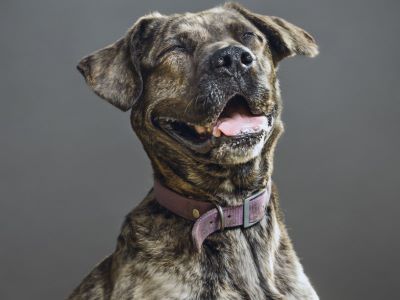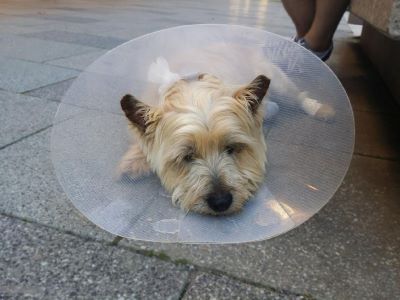Just like us, dogs can also be allergic to many substances including dust particles, materials, plants, grass, food etc.
It has been noticed that many pet parents are worried about the skin issues their pups are having because of the collars. This makes them think twice before using it again on their furry pal.

We’ve done some research on collar allergies. And came up with answers to questions like whether dogs can be allergic to collars, what collar allergens are, how to prevent them, and more.
So, keep reading to know in-depth knowledge!
Contents
Can a Collar Make a Dog Itchy?
Agreed, a dog collar is important for your pooch to wear when he steps out with you for a walk, or something else. But, we can’t overlook that a collar can make a dog itchy.

This problem mainly arises, when you are using the wrong size collar, keeping the collar too tight, or using material that is allergic to your pup. Further, which leads to an allergic reaction, rashes, or skin irritations.
Common Collar Allergens
Yup, collars can cause allergies in dogs. It is likely a reaction to the material used in the collar. In fact, yeasty irritation on the skin caused by the moist collar can lead to further skin allergic issues in dogs.
It has also been seen that skin issues are more noticeable in hairless dog breeds or dog breeds with thin hair.
In the following paragraph, we have covered some common collar allergens for your better knowledge.
Metal Allergies
If your dog is allergic to metal, then even a buckle attached to the collar will affect your pooch’s skin. It has been observed that hairless dog breeds are more prone to metal allergies than compared to other breeds.

Symptoms of metal collar allergies are itchiness, skin irritation, loss of fur, change in skin pigmentation, etc.
If your pooch’s skin cannot tolerate metal allergies, he might also be affected by metal bowls, crates, and other metal products.
Nylon Allergies
Nylon is a synthetic polymer, which includes many chemicals. Many of your dog’s products, and household products, are made from nylon material.

Nylon is included in products like clothing, dog toys, collars, leashes, rope, tents, etc.
It has also been observed that nylon allergies are very rare. There’s a high possibility, that your dog is getting allergies because of the chemicals used in nylon.
Ways Collar Can Harm Your Dog!
Collars are important for pet parents because they allow them to walk freely with their furry pal. Plus, Collars also let them put their dog’s ID and vaccination tags.
PETA states, “Collars should be worn outdoors for identification purposes only, not as a means of control.”
However, if collars are used in the wrong way, they can harm your dog, and even lead to serious injuries.
Keep reading to find out more!
Skin Allergy
Well, collars can cause skin allergy issues in dogs, like irritation, rashes, leave marks on their neck, etc. It happens mostly because of using the wrong size collar, material which is not suitable for your pup’s skin, pulling the collar to drag your dog, etc.

Neck Damage
Yeah, it’s true, if you use the wrong size collar for your pooch, it can cause neck injury to him. Similarly, using the wrong material collar can lead to skin reactions.

For instance, you go on a walk with your dog, and he stopped at one place and does not move ahead. In such case, when you try to pull his collar, you are hurting his neck by jerking it. Plus, a tight collar leaves a mark on his neck and dogs get rashes from tight harnesses/collars.
General Discomfort
Not only are dogs allergic to collars, but if a collar is of the wrong size, it can hurt them or create discomfort while walking. For instance, it can irritate your pup, leave marks on his neck, and rashes, which leads to skin reactions.
Due to collar discomfort, dogs start scratching their fur, neck, and head and become more cranky. So, along with the collar material, it is very important to look after the size of the collar, to provide proper comfort to your furry pal.
How to Prevent a Collar Allergy
Most of the dog’s skin is sensitive. And as discussed above, the collar can damage their fur and create skin issues.

Here, we have jotted down some prevention tips, which will help you to control the collar allergy and keep your furry pal’s skin healthy.
- It is advisable to wash the collar thoroughly before putting it on your dog.
- Remove the dirt, fleas, or any other allergic substance from the collar.
- If you want to keep your dog’s skin healthy, try feeding him a diet with ingredients that strengthen his skin’s immune system.
- Try to look for a collar which provides a cushion/padding feature.
- Consult the vet for skin treatment.
FAQs
Can a dog be allergic to a leather collar?
Leather collar allergies are often found in dogs, it is mainly due to direct contact of leather to skin. Mostly found in dogs with sensitive skin issues. The overreaction leads to other severe skin diseases in your furry pal.
Can dog collars cause irritation?
Yes, dog collars can cause skin irritation. It depends on the belt grip and material used in the collar. According to Wikipedia “Collars are often used in conjunction with a leash for restraining a dog. Collars can be traumatic to the trachea if the dog pulls against the restraint of the leash, causing severe pressure to the neck.” Like, if your pup’s skin is too sensitive, and chemical-formulated material is used in the collar, then he might end up with skin reactions.
What are the most common skin allergies in dogs?
The most common skin allergy in dogs is Flea Allergy Dermatitis (FAD), which is caused by a flea bite, causes itching issues, and it’s very painful. If not treated on time, it can lead to other severe skin diseases.
How do you treat collar rash on dogs?
After coming back from a walk, or completing outdoor activities, it is suggested to gently remove the collar from your dog’s neck. And smoothly clean the neck area, and use medicated shampoo for bathing, which will help to remove the sticky dust. In this way, you can prevent neck rashes. If already facing a rash issue, you can use a medicated ointment to cure it.
Well, It’s a Wrap!
- Collars can make a dog itchy, and lead to skin irritations.
- Yeasty irritation on the skin caused by the moist collar can lead to further skin allergic issues.
- Collars can cause skin allergy issues in dogs, like irritation, rashes, leave marks on their neck, etc.
- If you want to keep your dog’s skin healthy, try feeding him a diet with ingredients that strengthen his skin’s immune system.
References:
- (2022e, September 7). Allergies in Dogs and Puppies: Signs, Causes, and Treatment. https://www.petmd.com/dog/general-health/food-allergies-vs-seasonal-allergies-dogs
- (2012, May 30). Efficacy of an imidacloprid/flumethrin collar against fleas, ticks, mites and lice on dogs – Parasites & Vectors. BioMed Central. https://doi.org/10.1186/1756-3305-5-102
- Pressure and force on the canine neck when exercised using a collar and leash. (n.d.). Retrieved December 1, 2022, from https://www.sciencedirect.com/science/article/pii/S2451943X19301334?via=ihub

When it comes to dogs, Julia ignores nothing. Being an animal behaviorist, dog trainer and a dog parent she knows exactly how even a tiny change in a dog’s surroundings and diet can leave dogs disturbed for a longer duration. Hence, she always makes sure to review for us only the best products for dogs out there.

